|
|
|
Sort Order |
|
|
|
Items / Page
|
|
|
|
|
|
|
| Srl | Item |
| 1 |
ID:
157785
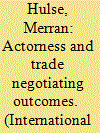

|
|
|
|
|
| Summary/Abstract |
In 2014, the EU concluded Economic Partnership Agreements (EPAs) with several African, Caribbean and Pacific (ACP) regions. These EPAs represent some of the most advanced examples of interregional cooperation. Yet, the outcomes of EPA negotiations are not the same across all regions. This article investigates differences in negotiated outcomes and argues that regional actorness – the ability of regions to become identifiable, to aggregate the interests of member states, to formulate collective goals and to make and implement decisions – influences regions’ ability to navigate interregional trade negotiations. In a comparison of the actorness and negotiated outcomes of West Africa and the SADC EPA Group, the article shows that actorness matters for international negotiations: regions with higher levels of actorness can negotiate better outcomes even under conditions of stark power asymmetry.
|
|
|
|
|
|
|
|
|
|
|
|
|
|
|
|
| 2 |
ID:
113961
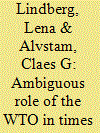

|
|
|
|
|
| Publication |
2012.
|
| Summary/Abstract |
The world trading system is characterized by a growing number of free trade agreements (FTAs). Limited progress in the negotiations at the multilateral level within the WTO has contributed to this development, inducing countries to seek faster, alternative ways to speed up liberalization, which make it possible to take advantage of preferential treatment with key trading partners. This article discusses what role the WTO should take with regard to FTAs in times of stalled multilateral negotiations and proliferating FTAs, and how FTAs can contribute to the multilateralization of regionalism. When results at the multilateral level are scarce, there may be a shift towards other alternatives in which the WTO is left out. This may force the WTO to function reactively, simply facing facts as an organization, rather than proactively, where it may play some role in shaping the FTA development. FTAs are not an entirely separate phenomenon from the WTO, since countries that negotiate FTAs play two roles. They are members of the WTO and as such are part of the work and negotiations of the organization. They are also part of trade arrangements that are limited to a smaller number of countries, and hence can negotiate against the interest of the entire multilateral organization. This article explores how these agreements can facilitate the work and negotiations of the WTO to regionalize bilateralism and multilateralize regionalism, here named the "sticky rice" approach. Various East Asian trade arrangements are used as empirical examples.
|
|
|
|
|
|
|
|
|
|
|
|
|
|
|
|
| 3 |
ID:
103861


|
|
|
|
|
| Publication |
2011.
|
| Summary/Abstract |
This article explores the role and effectiveness of small state trade diplomacy in the negotiations to conclude Economic Partnership Agreements (EPAs) between the European Union (EU) and the African, Caribbean and Pacific (ACP) group of countries, focusing specifically on the Southern African Development Community (SADC). Given the vast power asymmetries between the EU and the ACP, small states have had limited bargaining power to shape the process and the outcome of the negotiations. Unlike most other ACP EPA negotiations, the SADC small states were also caught between a rock (EU) and a hard place (South Africa), with both parties competing to promote their visions for regional integration. In the end, the EPA process split SADC into four sets of separate trade regimes with the EU, undermining the established regional integration project. The article explains this divisive outcome of the SADC EPA process by analysing the negotiation behaviour of the main parties, specifically the 'weaker' players. The article concludes with key lessons for small states' future trade negotiations.
|
|
|
|
|
|
|
|
|
|
|
|
|
|
|
|
| 4 |
ID:
146455
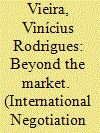

|
|
|
|
|
| Summary/Abstract |
Negotiators expect the World Trade Organization (WTO) to be an arena for states to pursue their material gain. However, the WTO also reflects symbolic aspects of international politics, in particular the notion of multilateralism. Although such a principle, in part, expresses Western dominance, Global South states have also benefited from multilateral regimes, and thus have incentives to legitimize them and behave according to their rules. Will the pattern of multilateralism change as other trade arrangements potentially gain more prominence? This article analyzes actions taken by Brazil and India in WTO’s Doha Development Agenda (DDA) and concludes that the multilateral system of trade will survive as Global South states participate in the organization to seek not just material gains but also to commit themselves to the international normative dimension.
|
|
|
|
|
|
|
|
|
|
|
|
|
|
|
|
| 5 |
ID:
162355
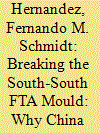

|
|
|
|
|
| Summary/Abstract |
China and New Zealand were able to sign a Free Trade Agreement (FTA) in 2008, in spite of the large differences in standards under which they were respectively negotiating trade agreements in the international arena. This article starts with a descriptive analysis of these differences between each country’s standards in terms of FTA quality. With the description of these standards, which seem to stand on opposite sides of a continuum, we examine why China and New Zealand decided to forego the standards under which they had negotiated previous agreements in order to find a middle ground. This process of convergence showcases how the interests of both parties moved them towards the adoption of a middle ground which enabled them to negotiate a win-win agreement.
|
|
|
|
|
|
|
|
|
|
|
|
|
|
|
|
| 6 |
ID:
152502
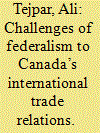

|
|
|
|
|
| Summary/Abstract |
As one of the first “second-generation” free trade agreements that address indirect and non-tariff barriers, the Canada–European Union Comprehensive Economic and Trade Agreement (CETA) is likely to serve as an international model. CETA, however, highlights significant challenges for Canadian federalism in both the negotiation and implementation processes of this and any such future trade agreements. While the inclusion of sub-federal governments allows for provinces/territories to help shape the provisions that fall within their jurisdictions, this paper argues that subsequent challenges arise in conveying a unified Canadian commitment to implement the agreement. Overall, the CETA negotiations demonstrated the significant institutional weaknesses of current federal–provincial/territorial relations with respect to international trade agreements. In the Canadian context, this suggests a need for “summit federalism” to ensure that all federal–provincial/territorial governments align their terms and interests and convey a unified commitment to fulfilling Canada’s current and future international trade agreements.
|
|
|
|
|
|
|
|
|
|
|
|
|
|
|
|
| 7 |
ID:
124726


|
|
|
|
|
| Publication |
2013.
|
| Summary/Abstract |
Why have the negotiations of a Comprehensive Economic and Trade Agreement (CETA) between Canada and the European Union taken so long? We argue that the delay is in good part the result of a weakly designed process for intergovernmental decision making: the role for provincial and territorial governments in international trade negotiations is still too limited and does not extend to final decisions about the text of any agreement. The limited role for provinces and the fact that there is no process that requires them to formally commit to an agreement leave open the real possibility that one or more provinces could choose not to fully implement any deal that is concluded. As a result, provinces possess negotiating leverage vis-à-vis Ottawa, thereby making it difficult for the federal government to agree to the trade-offs-which are of a geographical nature in CETA's case-that are necessary for reaching a positive agreement.
|
|
|
|
|
|
|
|
|
|
|
|
|
|
|
|
| 8 |
ID:
154260
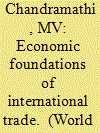

|
|
|
|
|
| Summary/Abstract |
The WTO was created to promote free trade at the Uruguay Round of talks in 1994 when the General Agreement on Tariffs and Trade was transformed into a permanent institution. The WTO is responsible for trade negotiations and disputes and handling national trade policies. Its agreements are endowed with technical assistance for developing countries and it also cooperates with other international bodies on trade related issues. In theory all members have an equal voice in the decision making process. With the increase of global free trade it is crucial that the WTO help speed up world economic activity. This however must be done taking into account cultural, economic and social consequences, particularly with regard to vulnerable groups. Dumping is the practice of selling goods in another country at a considerably lower price. Antidumping rules are deliberate measures that prevent a company from selling goods below cost and cause economic disturbances by shrinking markets.
|
|
|
|
|
|
|
|
|
|
|
|
|
|
|
|
| 9 |
ID:
085683


|
|
|
|
|
| Summary/Abstract |
Trade problems are an underlying cause of the financial crisis. To truly revive the world economy, a new trade consensus is necessary.
|
|
|
|
|
|
|
|
|
|
|
|
|
|
|
|
| 10 |
ID:
074186
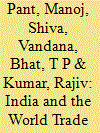

|
|
|
| 11 |
ID:
155489
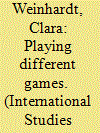

|
|
|
|
|
| Summary/Abstract |
The outcomes of international negotiations cannot be understood without considering how participants behave strategically. But how do “rules of the game” in negotiations—and the uncertainty that often surrounds them—shape this behavior? I examine the 2002–2007 period of the negotiations of Economic Partnership Agreements (EPAs) between the European Union and West Africa. I argue that both sides made misguided strategic choices. Their misperceptions of the rules operative in trade negotiations with a “development dimension” facilitated the emergence of an impasse during the 2002–2007 negotiating period of the EPA process. In order to explain why, we should conceive of bargaining processes as spaces defined by unstable and potentially contested rules. I offer three mechanisms —payoff disjuncture, choice-range disjuncture, and style disjuncture—that help account for how misperceptions of these socially constructed rules can prevent, or at least delay, cooperation. My approach complements rationalist theories that rely on the insights of game theory with a constructivist perspective that brings to light the socially constructed nature of negotiation processes.
|
|
|
|
|
|
|
|
|
|
|
|
|
|
|
|
| 12 |
ID:
121867
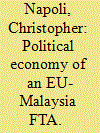

|
|
|
|
|
| Publication |
2013.
|
| Summary/Abstract |
In September 2010, the European Union (EU) and Malaysia began negotiating a free trade agreement (FTA). This paper examines the prospects and challenges facing the EU-Malaysia FTA negotiations from a political economy perspective. It will argue two points. First, while a deep FTA would offer significant welfare gains to Malaysia, a deep agreement is unlikely to be negotiated. This is because of the difficulty Malaysia would have in opening its services markets and changing investment regulations. Second, even a deep FTA would be of little economic or strategic use for the EU. Both points beg the question: why bother negotiating an FTA?
|
|
|
|
|
|
|
|
|
|
|
|
|
|
|
|
| 13 |
ID:
178325
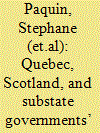

|
|
|
|
|
| Summary/Abstract |
Following Brexit (the withdrawal of the UK from the EU and the European Atomic Energy Community at the end of 31 January 2020), the British government stated that it hoped to reach a new trade agreement with Canada to be modelled after the Canada–EU Comprehensive Economic and Trade Agreement, the first free-trade deal for which Canadian provinces were directly involved at every stage of negotiations. In the UK, while there are mechanisms for the involvement of devolved regions in European policy, there is no clear constitutional doctrine as to the roles they should play in elaborating trade policy more generally. Moreover, the asymmetric nature of the UK’s devolution system complicates the involvement of its devolved governments in trade negotiations. By providing a specific focus on the cases of Quebec and Scotland, this article provides a comparison of substate governments’ roles in trade negotiation and trade promotion. It concludes that, while there seems to be only limited scope for substate governments’ formal input into future trade negotiations, their trade and investment promotion organizations allow them to pursue different objectives over trade outcomes within a unified national framework.
|
|
|
|
|
|
|
|
|
|
|
|
|
|
|
|
| 14 |
ID:
090296
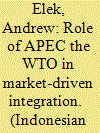

|
|
|
| 15 |
ID:
106464
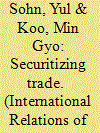

|
|
|
|
|
| Publication |
2011.
|
| Summary/Abstract |
The Korea-US free trade agreement (KORUS FTA) of 2007 clearly shows how countries simultaneously pursue economic benefits and strategic interests in trade negotiations. This study argues that the surprise launch and the successful conclusion of the KORUS FTA illustrate the joint efforts by the United States and the Republic of Korea to re-securitize their bilateral economic relations. Security and strategic calculations held by top policy-makers on both sides catalyzed the official launch of FTA negotiations by removing a number of longstanding trade irritants such as Korea's screen quotas and ban on US beefs. At the post-negotiation stage, however, the lack of bipartisanship-particularly in the United States-to provide trade liberalization for their allies in favor of their own broader strategic interests has led to the legislative stalemate of executive efforts at re-securitization of trade relations. This study concludes that the stalemated ratification process shows the erosion, not the strength, of US power to provide security and trade liberalization as public goods.
|
|
|
|
|
|
|
|
|
|
|
|
|
|
|
|
| 16 |
ID:
178124
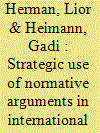

|
|
|
|
|
| Summary/Abstract |
This article claims that normative arguments play a greater role in negotiations than existing scholarship implies. While the approaches of communicative and rhetorical action limit the use of arguments to environments that meet certain conditions, in fact normative arguments are widely used and can be found in almost every example of negotiations. This article seeks to explain this phenomenon. Negotiating parties that feel obligated to tackle normative arguments raised by the opposing side – either because of the presence of an audience or to maintain its reputation – have a number of tools at their disposal. Negotiators who are unsuccessful in tackling these arguments will tend to offer a proposal that is more attractive to the other side. Although normative arguments do not generally have a sweeping influence on the outcome of negotiations, they are still likely to play a significant role. The article applies this theoretical framework to the case of the lengthy negotiations between the EEC and Israel, in which the former had no material motivation and desire to cede to Israel’s demands and nevertheless did so.
|
|
|
|
|
|
|
|
|
|
|
|
|
|
|
|
| 17 |
ID:
163650


|
|
|
|
|
| Summary/Abstract |
Although stalled since 2016, the negotiations on a Transatlantic Trade and Investment Partnership (TTIP) have had major unintended consequences. The TTIP led to demands from third countries to upgrade their trade relationship with the EU and to unprecedented politicisation. As second-order effects of the latter, it endangered the EU-Canada trade agreement and brought about reform of EU trade governance and amendments to EU trade policy positions. These unintended consequences occurred because of inflated expectations about and insufficient awareness of the different nature of TTIP with regard to scope and partner compared to other trade negotiations. In the meantime, EU trade policy has adapted to the new politics of trade, making unintended consequences less likely.
|
|
|
|
|
|
|
|
|
|
|
|
|
|
|
|
| 18 |
ID:
149060
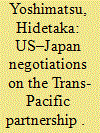

|
|
|
|
|
| Summary/Abstract |
This article explores which factors influenced the process of US–Japan negotiations on the Trans-Pacific Partnership. It argues that while pressures from major societal groups and legislative members hampered progress of bilateral negotiations, state leaders’ preferences for reacting strategically to geopolitical and geo-economic developments played a catalytic role in propelling the negotiations.
|
|
|
|
|
|
|
|
|
|
|
|
|
|
|
|
| 19 |
ID:
149231
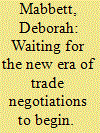

|
|
|
| 20 |
ID:
075083
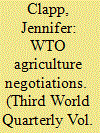

|
|
|
|
|
| Publication |
2006.
|
| Summary/Abstract |
The Doha 'Development' Round of trade negotiations at the wto has featured agricultural trade liberalisation as one of its key aims. But developing countries were frustrated with both the process and the content of the agricultural agreement negotiations early on in the round. This prompted these countries, through a number of developing country groupings such as the G-20 and others, to call for changes in the talks to ensure that developing country voices and concerns were heard. Although developing countries were in many ways successful in registering their concerns in the latter half of the negotiations, and have maintained a fairly high degree of cohesion across the Global South, it remains unclear whether this cohesion will last as the uneven impacts of agricultural trade liberalisation become apparent.
|
|
|
|
|
|
|
|
|
|
|
|
|
|
|
|
|
|
|
|
|